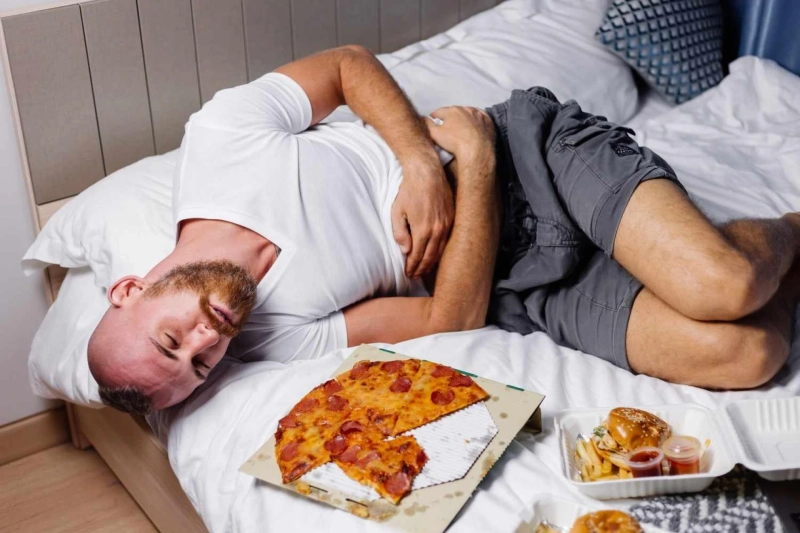Human body needs a constant flow of energy to perform necessary tasks like breathing, digesting food, and maintaining heartbeat. Calorie is needed for these tasks to be performed properly. You will be surprised to know that your body continues to burn calories even during resting periods like sleeping. In this write-up, we will discuss how many calories do you burn sleeping, impacting factors and how to burn more calories during sleep.
How many calories do you burn sleeping?
Your body uses energy while you sleep in order to maintain itself and keep you alive. During sleep, for example, the brain consolidates memories and forms new connections between neurons. Simultaneously, it blocks out irrelevant data to create space for fresh memories, including the lessons you acquire throughout the day.
So, how many calories do you burn sleeping? During sleep, you burn between 40 and 80 calories every hour. You should therefore try to burn between 320 and 640 calories every night throughout an 8-hour period.
At night, your body also generates enzymes, hormones, and some nutrients. It also creates new tissues and fixes damaged ones. Your body fights infection and maintains a robust immune system thanks to the proteins called cytokines and antibodies that are released while you sleep.
Impacting Factors
Now that you know how many calories do you burn sleeping, let's check out the impacting factors.
1. Basal Metabolic Rate (BMR)
Your basal metabolic rate is the minimum number of calories your body needs to perform essential functions like breathing, blood circulation, and cell repair. Your BMR makes up the largest portion, 60-70%, of the total calories you burn daily. People with a higher BMR tend to burn more calories at rest. BMR is influenced by your age, gender, body size and composition.
2. Muscle Mass
Muscle mass significantly impacts how many calories do you burn sleeping. The resting metabolic rate depends on the muscle mass. Muscle tissue is metabolically active and consumes calories even when at rest to maintain itself. People with more muscle mass have a higher resting metabolic rate compared to people with less muscle but the same body weight. Building muscle through strength training can help increase the calories you passively burn during sleep.
3. Body Size and Composition
Larger bodies burn more calories at rest than smaller bodies because they require more energy for maintenance. The composition of weight also impacts calories burned. A pound of muscle burns about 6 calories per day at rest while a pound of fat burns about 2 calories. As such, two people of equal weight can burn vastly different amounts of calories based on their muscle-to-fat ratio.
4. Age
Age is another very important factor that impacts how many calories do you burn sleeping. As you get older, the amount of muscle tends to decrease and body fat increases, even if your weight stays the same. This change in body composition leads to a drop in resting metabolic rate by about 2% per decade after age 20. Older people, therefore, burn fewer calories during sleep. Engaging in regular strength training can help offset this age-related loss of muscle.
5. Physical Activity
Your activity level impacts how many calories you burn at night. When you are more active and burn more calories during the day, your metabolism remains elevated at night. This is because your body is recovering from the increased activity during sleep. More intense or longer duration activities result in a great calorie burn overnight.
6. Diet and Eating Habits
What and when you eat influences your resting metabolic rate. Consuming more protein leads to a slight boost in metabolic rate. This is because it takes more energy for your body to digest and metabolise protein. Eating larger meals later in the day can also result in a higher calorie burn overnight as your body works to digest the food while you sleep.
How to Burn More Calories?
1. Do More Exercise
Engaging in regular physical activity is one of the most effective ways to ramp up calorie burning. Exercise, especially strength training, builds muscle mass. Since muscle is metabolically active, the more you have, the more calories you burn 24/7. Try to do 150-300 minutes of moderate exercise per week. This can include brisk walking, swimming, cycling or playing sports..
2. Increase Your Protein Intake
Eating adequate protein is key for building and maintaining muscle mass. Getting enough protein also gives your metabolic rate a slight boost, equating to about 80-100 extra calories per day being burned. Include a source of lean protein like eggs, chicken breast, fish or tofu in every meal. Most adults need 0.8-1 gram of protein per kilogram of body weight daily. Consuming 20-40 grams of protein 4-5 times per day is an effective strategy.
3. Turn Down the Heat
Sleeping in a cool room correlates with getting better sleep and burning extra calories overnight. Studies show sleeping in temperatures around 65°F can increase calorie expenditure by up to 100-400 calories daily compared to sleeping in a 75°F room. Turning down the thermostat a few degrees overnight simulates a natural drop in body temperature that occurs during sleep.
4. Get Enough Quality Sleep
Lack of sleep can negatively impact your resting metabolic rate. Adults sleeping less than 5 hours per night burn over 300 fewer calories daily than those getting 7-8 hours. Poor sleep decreases glucose metabolism efficiency, leading to increased insulin resistance and reduced calorie burning. You should try to get 7-9 hours of quality sleep each night to maintain good sleeping habits.
Conclusion
Knowing how many calories do you burn sleeping allows you to check the resting metabolic rate and overall energy release. A higher calorie burn during sleep indicates a revived metabolism. You can boost your nightly calorie burn by treating any underlying health concerns that may be interfering with your sleep and adopting appropriate sleep hygiene practices. Boosting your calorie burn during sleep contributes to greater fat loss over time.



